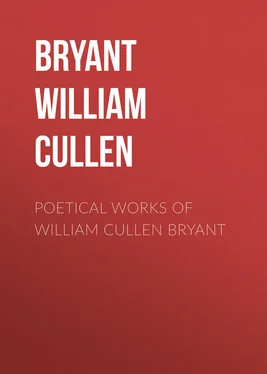William Bryant - Poetical Works of William Cullen Bryant
Здесь есть возможность читать онлайн «William Bryant - Poetical Works of William Cullen Bryant» — ознакомительный отрывок электронной книги совершенно бесплатно, а после прочтения отрывка купить полную версию. В некоторых случаях можно слушать аудио, скачать через торрент в формате fb2 и присутствует краткое содержание. ISBN: , Жанр: foreign_antique, foreign_prose, foreign_poetry, на английском языке. Описание произведения, (предисловие) а так же отзывы посетителей доступны на портале библиотеки ЛибКат.
- Название:Poetical Works of William Cullen Bryant
- Автор:
- Жанр:
- Год:неизвестен
- ISBN:http://www.gutenberg.org/ebooks/29700
- Рейтинг книги:3 / 5. Голосов: 1
-
Избранное:Добавить в избранное
- Отзывы:
-
Ваша оценка:
- 60
- 1
- 2
- 3
- 4
- 5
Poetical Works of William Cullen Bryant: краткое содержание, описание и аннотация
Предлагаем к чтению аннотацию, описание, краткое содержание или предисловие (зависит от того, что написал сам автор книги «Poetical Works of William Cullen Bryant»). Если вы не нашли необходимую информацию о книге — напишите в комментариях, мы постараемся отыскать её.
Poetical Works of William Cullen Bryant — читать онлайн ознакомительный отрывок
Ниже представлен текст книги, разбитый по страницам. Система сохранения места последней прочитанной страницы, позволяет с удобством читать онлайн бесплатно книгу «Poetical Works of William Cullen Bryant», без необходимости каждый раз заново искать на чём Вы остановились. Поставьте закладку, и сможете в любой момент перейти на страницу, на которой закончили чтение.
Интервал:
Закладка:
"O good gray head that all men knew"
rose unbidden to one's lips as he passed his fellow-pedestrians in the streets of the great city, active, alert, with a springing step and a buoyant gait. He was seen in all weathers, walking down to his office in the morning, and back to his house in the afternoon – an observant antiquity, with a majestic white beard, a pair of sharp eyes, and a face which, noticed closely, recalled the line of the poet:
"A million wrinkles carved his skin."
Mr. Bryant had a peculiar talent, in which the French excel – the talent of delivering discourses upon the lives and writings of eminent men; and he was always in request after the death of his contemporaries.
Beginning with a eulogy on his friend Cole, the painter, who died in 1848, he paid his well-considered tributes to the memory of Cooper and Irving, and assisted at the dedication in the Central Park of the Morse, Shakespeare, Scott, and Halleck monuments. His addresses on those occasions, and others that might be named, were models of justice of appreciation and felicity of expression. His last public appearance was at the Central Park, on the afternoon of May 29, 1878, at the unveiling of a statue to Mazzini. It was an unusually hot day, and after delivering his address, which was remarkable for its eloquence, he accompanied General James Grant Wilson, an acquaintance of some years' standing, to his residence in East Seventy-fourth street. General Wilson reached his door with Mr. Bryant leaning on his arm; he took a step in advance to open the inner door, and while his back was turned the poet fell, striking his head on the stone platform of the front steps. It was his death-blow; for, though he recovered his consciousness sufficiently to converse a little, and was able to ride to his own house with General Wilson, his fate was sealed. He lingered until the morning of the 12th of June, when his capacious spirit passed out into the Unknown. Two days later all that was mortal of him was buried beside the grave of his wife at Roslyn.
Such was the life and such the life-work of William Cullen Bryant.
R. H. STODDARD.TO THE READER
The poems in this volume follow each other in the order in which they were written, it being believed that this arrangement would be as satisfactory to the reader as any classification founded on the nature of the subjects or their mode of treatment.
POEMS
THE AGES 1 1 In this poem, written and first printed in the year 1821, the author has endeavored, from a survey of the past ages of the world, and of the successive advances of mankind in knowledge, virtue, and happiness, to justify and confirm the hopes of the philanthropist for the future destinies of the human race.
When to the common rest that crowns our days,
Called in the noon of life, the good man goes,
Or full of years, and ripe in wisdom, lays
His silver temples in their last repose;
When, o'er the buds of youth, the death-wind blows
And blights the fairest; when our bitter tears
Stream, as the eyes of those that love us close,
We think on what they were, with many fears
Lest goodness die with them, and leave the coming years.
And therefore, to our hearts, the days gone by,
When lived the honored sage whose death we wept,
And the soft virtues beamed from many an eye,
And beat in many a heart that long has slept —
Like spots of earth where angel-feet have stepped,
Are holy; and high-dreaming bards have told
Of times when worth was crowned, and faith was kept,
Ere friendship grew a snare, or love waxed cold —
Those pure and happy times – the golden days of old.
Peace to the just man's memory; let it grow
Greener with years, and blossom through the flight
Of ages; let the mimic canvas show
His calm benevolent features; let the light
Stream on his deeds of love, that shunned the sight
Of all but heaven, and in the book of fame
The glorious record of his virtues write
And hold it up to men, and bid them claim
A palm like his, and catch from him the hallowed flame.
But oh, despair not of their fate who rise
To dwell upon the earth when we withdraw!
Lo! the same shaft by which the righteous dies,
Strikes through the wretch that scoffed at mercy's law
And trode his brethren down, and felt no awe
Of Him who will avenge them. Stainless worth,
Such as the sternest age of virtue saw,
Ripens, meanwhile, till time shall call it forth
From the low modest shade, to light and bless the earth.
Has Nature, in her calm, majestic march,
Faltered with age at last? does the bright sun
Grow dim in heaven? or, in their far blue arch,
Sparkle the crowd of stars, when day is done,
Less brightly? when the dew-lipped Spring comes on,
Breathes she with airs less soft, or scents the sky
With flowers less fair than when her reign begun?
Does prodigal Autumn, to our age, deny
The plenty that once swelled beneath his sober eye?
Look on this beautiful world, and read the truth
In her fair page; see, every season brings
New change, to her, of everlasting youth;
Still the green soil, with joyous living things,
Swarms, the wide air is full of joyous wings,
And myriads, still, are happy in the sleep
Of ocean's azure gulfs, and where he flings
The restless surge. Eternal Love doth keep,
In his complacent arms, the earth, the air, the deep.
Will then the merciful One, who stamped our race
With his own image, and who gave them sway
O'er earth, and the glad dwellers on her face,
Now that our swarming nations far away
Are spread, where'er the moist earth drinks the day,
Forget the ancient care that taught and nursed
His latest offspring? will he quench the ray
Infused by his own forming smile at first,
And leave a work so fair all blighted and accursed?
Oh, no! a thousand cheerful omens give
Hope of yet happier days, whose dawn is nigh.
He who has tamed the elements, shall not live
The slave of his own passions; he whose eye
Unwinds the eternal dances of the sky,
And in the abyss of brightness dares to span
The sun's broad circle, rising yet more high,
In God's magnificent works his will shall scan —
And love and peace shall make their paradise with man.
Sit at the feet of History – through the night
Of years the steps of virtue she shall trace,
And show the earlier ages, where her sight
Can pierce the eternal shadows o'er their face; —
When, from the genial cradle of our race,
Went forth the tribes of men, their pleasant lot
To choose, where palm-groves cooled their dwelling-place,
Or freshening rivers ran; and there forgot
The truth of heaven, and kneeled to gods that heard them not.
Then waited not the murderer for the night,
But smote his brother down in the bright day,
And he who felt the wrong, and had the might,
His own avenger, girt himself to slay;
Beside the path the unburied carcass lay;
The shepherd, by the fountains of the glen,
Fled, while the robber swept his flock away,
And slew his babes. The sick, untended then,
Languished in the damp shade, and died afar from men.
Интервал:
Закладка:
Похожие книги на «Poetical Works of William Cullen Bryant»
Представляем Вашему вниманию похожие книги на «Poetical Works of William Cullen Bryant» списком для выбора. Мы отобрали схожую по названию и смыслу литературу в надежде предоставить читателям больше вариантов отыскать новые, интересные, ещё непрочитанные произведения.
Обсуждение, отзывы о книге «Poetical Works of William Cullen Bryant» и просто собственные мнения читателей. Оставьте ваши комментарии, напишите, что Вы думаете о произведении, его смысле или главных героях. Укажите что конкретно понравилось, а что нет, и почему Вы так считаете.












